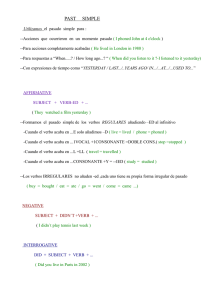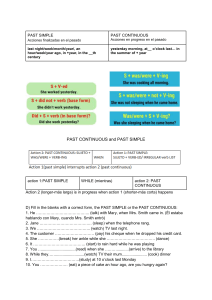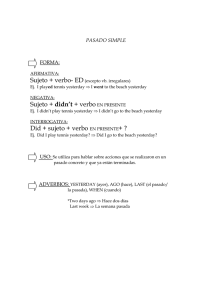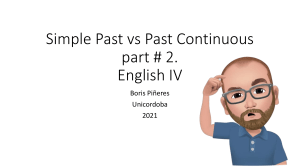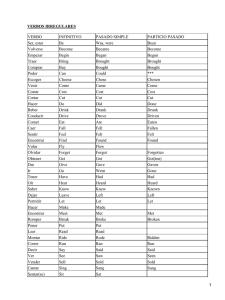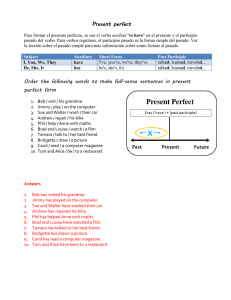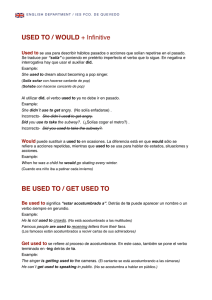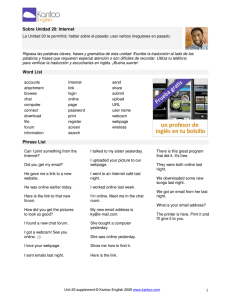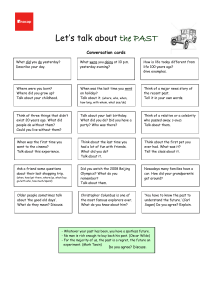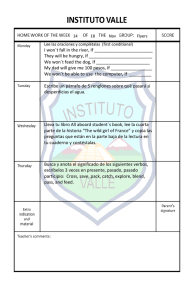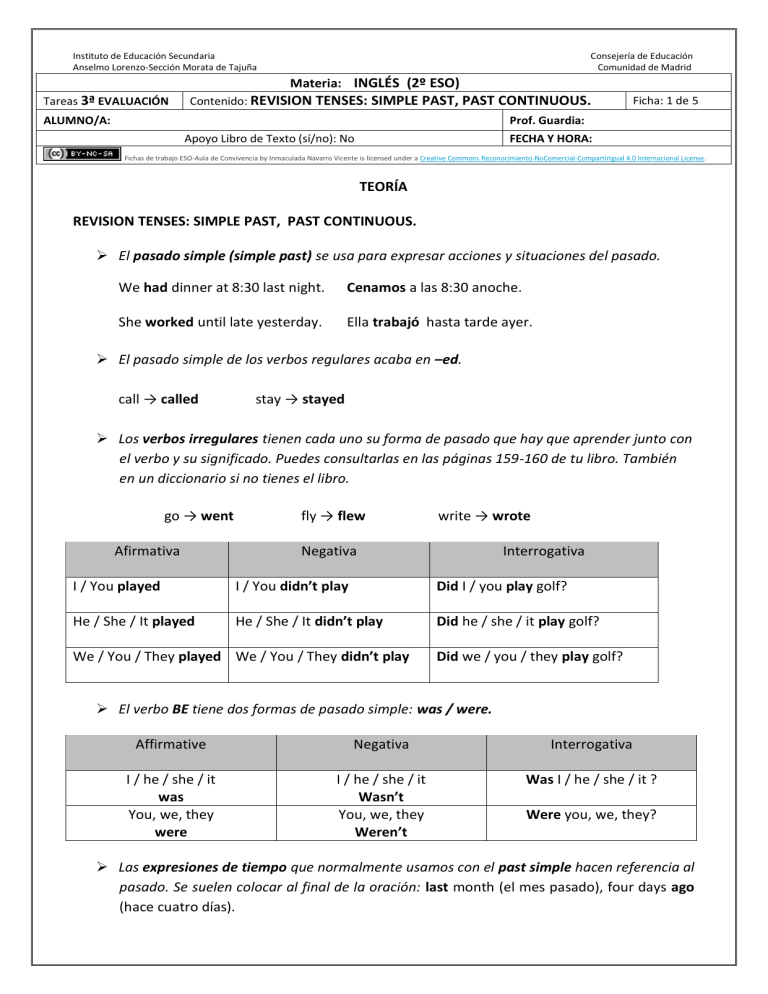
Instituto de Educación Secundaria Anselmo Lorenzo-Sección Morata de Tajuña Consejería de Educación Comunidad de Madrid Materia: INGLÉS (2º ESO) Tareas 3ª EVALUACIÓN Contenido: REVISION TENSES: SIMPLE PAST, PAST CONTINUOUS. ALUMNO/A: Ficha: 1 de 5 Prof. Guardia: Apoyo Libro de Texto (sí/no): No FECHA Y HORA: Fichas de trabajo ESO-Aula de Convivencia by Inmaculada Navarro Vicente is licensed under a Creative Commons Reconocimiento-NoComercial-CompartirIgual 4.0 Internacional License. TEORÍA REVISION TENSES: SIMPLE PAST, PAST CONTINUOUS. El pasado simple (simple past) se usa para expresar acciones y situaciones del pasado. We had dinner at 8:30 last night. Cenamos a las 8:30 anoche. She worked until late yesterday. Ella trabajó hasta tarde ayer. El pasado simple de los verbos regulares acaba en –ed. call → called stay → stayed Los verbos irregulares tienen cada uno su forma de pasado que hay que aprender junto con el verbo y su significado. Puedes consultarlas en las páginas 159-160 de tu libro. También en un diccionario si no tienes el libro. go → went Afirmativa fly → flew write → wrote Negativa Interrogativa I / You played I / You didn’t play Did I / you play golf? He / She / It played He / She / It didn’t play Did he / she / it play golf? We / You / They played We / You / They didn’t play Did we / you / they play golf? El verbo BE tiene dos formas de pasado simple: was / were. Affirmative Negativa Interrogativa I / he / she / it was You, we, they were I / he / she / it Wasn’t You, we, they Weren’t Was I / he / she / it ? Were you, we, they? Las expresiones de tiempo que normalmente usamos con el past simple hacen referencia al pasado. Se suelen colocar al final de la oración: last month (el mes pasado), four days ago (hace cuatro días). El past continuous se forma con el verbo be (was / were)+ verbo en –ing. Usamos el past continuous para expresar acciones que estaban ocurriendo en un momento concreto del pasado. I was doing homework yesterday at 5. He was playing tennis at 6 o´clock this evening. tarde. Afirmativa Estaba haciendo deberes ayer a las 5. Él estaba jugando al tenis a las 6 esta Negativa Interrogativa I was working I wasn’t working Was I working? You were working You weren’t working Were you working? He / she / it was working He / she / it wasn’t working Was he / she / it working? We / you / they were working We / you / they weren’t working Were we / you / they working? CONTRASTE ENTRE EL PAST SIMPLE Y EL PAST CONTINUOUS Es frecuente encontrar en una misma frase los dos tiempos, el Past continuous y el Past simple. The girl was speaking on the phone when her mum came home. La chica estaba hablando porteléfono cuando su madre llegó a casa. Con el past continuous describimos una acción prolongada que estaba sucediendo: The girl was speaking on the phone Con el past simple expresamos una acción breve que interrumpió una larga: when her mum came home. Utilizamos when (cuando) delante del past simple y while (mientras) delante del past continuous. Instituto de Educación Secundaria Anselmo Lorenzo-Sección Morata de Tajuña Consejería de Educación Comunidad de Madrid Materia: INGLÉS (2º ESO) Tareas 3ª EVALUACIÓN Contenido: REVISION TENSES: SIMPLE PAST, PAST CONTINUOUS. ALUMNO/A: Ficha: 1 de 5 Prof. Guardia: Apoyo Libro de Texto (sí/no): No FECHA Y HORA: Fichas de trabajo ESO-Aula de Convivencia by Inmaculada Navarro Vicente is licensed under a Creative Commons Reconocimiento-NoComercial-CompartirIgual 4.0 Internacional License. EJERCICIOS 1. Complete the sentences with the past simple affirmative of the verbs in brackets. a. The woman __________________________her car when she _________________the accident. (stop, see) b. He ___________________________fruit and cereal for breakfast. (have) c. My dad __________________________as an actor when he was young. (work) d. We __________________________to school yesterday. (walk) e. My mum ___________________________to Paris with some friends. (go) f. She _____________________________to learn Chinese last year. (try) 2. Write the sentences in exercise 1 in the negative. a. b. c. d. e. f. 3. Make questions in the simple past. a. What / you / have / for lunch / yesterday? ________________________________________________ b. When / your mum / finish / work / last week? ________________________________________________ c. They / go / to the mountains / last Christmas? ________________________________________________ 4. Complete the sentences with the simple past of the verb BE, in affirmative or negative. a. b. c. d. My friends __________________ at school yesterday. √ He ________________at the cinema last weekend. X You _____________________tired after the basketball match. X We _____________________happy because we won the lottery. √ 5. Order the words to make questions. a. You / at 3 o´clock / at home / yesterday ? ____________________________________________ b. Last week / was / hot / it ? ____________________________________________ c. From / where / Shakespeare / was ? ____________________________________________ 6. Complete the sentence with the past continuous affirmative of the verbs in the box. Drive have listen read swim watch a. b. c. d. Leslie ____________________________ a comedy. My mum _____________________________her car. They ______________________________to pop music. We _______________________________a wonderful time at the party. 7. a. b. c. d. Write the sentences in exercise 1 in the negative form. _____________________________________________________ _____________________________________________________ _____________________________________________________ _____________________________________________________ 8. Order the sentences to make questions. a. In the morning / was / swimming / Peter ? _____________________________________________________? b. Maggie / playing baseball / was / at 6 pm ? _____________________________________________________? c. You / were / doing homework / yesterday afternoon? _____________________________________________________? d. At / 9 am / he / was / having breakfast? _____________________________________________________? e. Your friends / basketball / playing / at 6 pm yesterday / were ? _____________________________________________________? 9. Complete the sentences with the correct form of the verbs in brackets. Use the past simple or the past continuous. a. While I was waiting for the bus, I __________________my dad in his car. (see) b. He was carrying the shopping when he __________________the apples. (drop) c. While he __________________________TV, I made dinner. (watch) Instituto de Educación Secundaria Anselmo Lorenzo-Sección Morata de Tajuña Consejería de Educación Comunidad de Madrid Materia: INGLÉS (2º ESO) Tareas 3ª EVALUACIÓN Contenido: REVISION TENSES: SIMPLE PAST, PAST CONTINUOUS. ALUMNO/A: Ficha: 1 de 5 Prof. Guardia: Apoyo Libro de Texto (sí/no): No FECHA Y HORA: Fichas de trabajo ESO-Aula de Convivencia by Inmaculada Navarro Vicente is licensed under a Creative Commons Reconocimiento-NoComercial-CompartirIgual 4.0 Internacional License. d. My mum ___________________________ at the office when I called her. (work) e. I _____________________________my homework when my friend called me. (do) f. When I _____________________________Susan, she was wearing glasses. (meet) 10. Circle the correct words. a. I was singing when / while the microphone broke. b. They heard a big noise when / while they were watching a horror film. c. When / while I was cleaning my bedroom, I found my watch under the bed. d. When / while my sister arrived home, I was sleeping. e. I was revising for the exam when / while the teacher arrived. f. My dad found some good books when / while he was cleaning his office. 11. Correct the errors. a. Was Bob swim in the morning? ____________________________________ b. Claire was sing in her bedroom. ____________________________________ c. We didn’t eating fruit yesterday. _____________________________________ d. What were you do yesterday at 8pm? _____________________________________ e. Did you doing homework when I phoned you? _____________________________________ f. You weren’t dance at the party at 1am. _____________________________________ g. While he ate his sandwich he was watching the game on TV. _____________________________________ VALORACIÓN DEL PROFESOR DE GUARDIA OBSERVACIONES ¿Trabaja? SI NO
